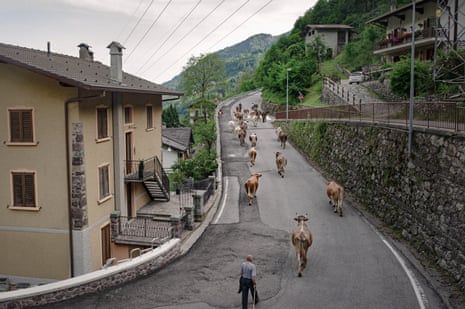
Every June the magic repeats, starting from the small town of Mezzoldo, Italy. Juri Salvini, the head of the family, started working with his uncle at the age of 12 in a pasture called Alpe Terzera, where he still brings his cows today. This ancient practice is now part of the history of the Salvini family, composed of Juri, Katya, Alessandra and Elena, who continue to carry on this tradition every summer.

Above: travelling towards the first of the six stopovers on the steep track leading to the alpine pastures towards which the Salvini family head each year. Right: Juri pours water for his cattle. Far right: the Salvini cows during the ascent to the Cima mountain hut, their final destination each summer from their home in Mezzoldo


The whole family moves to the high mountain pastures with the animals, where they live in huts and spend their days suspended in time, far from the frenetic life of the close-by valley, where industry has long replaced the work of the shepherds (bergamino in local dialect).
Here in the Orobie Alps the animals feed in the open air and every morning the ritual of milking in the pasture is carried out. The milk is transformed into dairy products which, when the time comes, will be brought down to the valley on horseback.

The Salvini family milk their cows between the Nuova mountain hut and the Dossello mountain hut
Katya is the family cheese maker. She is in charge of producing high-quality products, which differ from the intensive farming and industrial products that supermarkets are full of. Born and raised in Valnegra, she says sheep farming and breeding were not part of her upbringing – she learned the profession out of love, becoming passionate about a lifestyle that had already been lost in the country where she was born.



Top: Katya is the family’s dedicated cheesemaker. Above left: due to the presence of alpine grasses, milk produced during the summer transhumance is of a higher quality and has a higher nutritional value than that produced in the valleys. Above right: wooden bowls used by the family are placed in a pot over the fire after age-old rituals of life in a mountain hut
In the Brembana valley, the relationship with nature and the value that the pastures give to the local biodiversity are two pillars that have resisted the changes, unlike elsewhere. The desire to return to a rural life, respecting the territory and feeding on genuine local products, resonates through the community. In addition to its practical value, transhumance has a profound cultural meaning.

Juri near the Dossello mountain hut
It represents the connection between man and nature; the interdependence between the local community and the mountains. It is a celebration of traditions, with festivities and rituals that accompany the passage of the cattle involving the entire community.

The Salvini family rest after their meal near the Nuova mountain hut
Today, the history of the Salvini family is an important example of sustainability, since transhumance offers an alternative model based on the intelligent management of resources. But the history of the Salvini family goes beyond producing excellent products. Up there, away from the noise, the family experiences all the magic of a lifestyle seasoned with sweat and effort.

Above: Juri removes temporary fencing, used to control the cattle, at the Casera mountain hut. Right: cheese is loaded into a packsaddle. Far right: Juri prepares to return to the valley from the Cima mountain hut, the highest of the huts the family spend the summer months


Juri, a hard worker with a taciturn and assertive character, carries out the most strenuous activities. Setting up the fences, cleaning the pastures, loading the mules and taking care of the milking is his daily bread. Katya, his partner, tidies up the shelters during breaks from work and follows the education of her daughters, including summer homework, proving to be a loving and present mother. Elena, the little one of the house, is the most followed and pampered, while Alessandra is a diligent older sister who is passionate about her parents’ work. For her, cows are part of her family and she is not averse to petting them.

Above: Elena with her family’s cows at the Cima mountain hut. Right: Alessandra, the eldest daughter in the Salvini family, with a lamb near the Casera mountain hut, one of the family’s first stops towards the alpine pastures. Far right: Katya takes a break


Despite the hard work during the day, the family never fail to get together around a table. Up here, after having eaten a good meal and shared thoughts, one gives in to the sacred rest in the afternoon or at night. The days start early and end late. Mechanical means are reduced to the bone, and fatigue and sweat are the daily agenda.
Comforts are few and people are tempered by the spirit of adaptation and silence, which delves inside making them pragmatic and wise. For people such as the Salvinis who are used to a life in close contact with nature, it is difficult to imagine a life in a big city, clocking in for work and thinking about what to do to have fun after work.

Juri and Elena near the San Simone Pass
Work has a component of adventure and satisfaction that is difficult to give up. But the warm season doesn’t last for ever and the winters in these mountains are long and cold. Therefore, at the end of each summer the mules are loaded, the huts are closed and people return to the valley, in a “civilisation” that chases profit, in which time is closely linked to money.



The Salvini family during their descent from the alpine pastures, which takes place every September at the end of the summer season.
The hope is that this ancient practice will survive and be handed down from father to son, as it has been for centuries in these mountains, so that the magic can be repeated again every summer.










 English (US)
English (US)